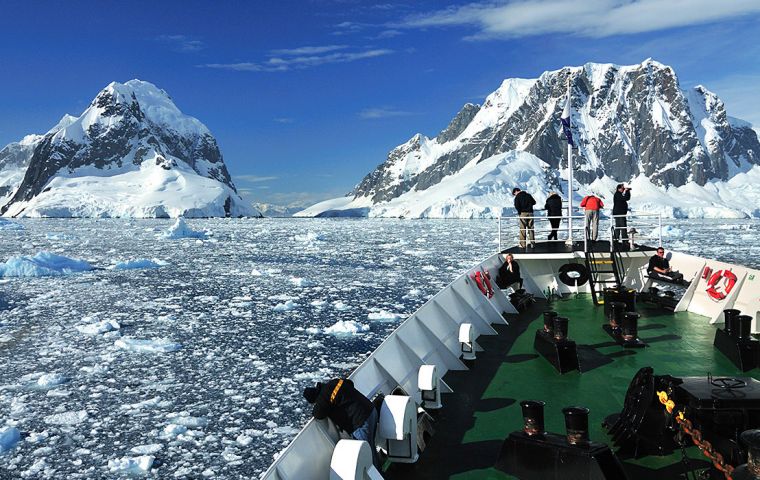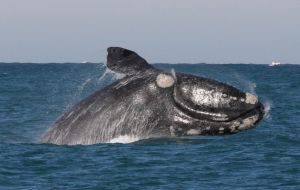MercoPress. South Atlantic News Agency
BAS team doing first scientific Southern right whale survey in South Georgia
 The team of researchers will spend five weeks on the research vessel 'Song of the Whale' to investigate the health of the animals in their feeding grounds.
The team of researchers will spend five weeks on the research vessel 'Song of the Whale' to investigate the health of the animals in their feeding grounds.  Southern right whale populations were decimated after nearly 300 years of hunting in the South Atlantic.
Southern right whale populations were decimated after nearly 300 years of hunting in the South Atlantic. An international team of researchers, led by British Antarctic Survey (BAS), travels to the sub-Antarctic island of South Georgia this month to carry out the first scientific whale survey since whaling stopped in the 1970s.
Southern right whale populations were decimated after nearly 300 years of hunting in the South Atlantic. When commercial operations stopped, populations were expected to recover. The team of eight researchers and three crew, will spend five weeks on the research vessel 'Song of the Whale' to investigate the health of the animals in their feeding grounds. In addition, they hope to solve the puzzle of why large numbers of dead whale calves have washed up on the shores around Argentina in the last decade.
Photo-identifications and satellite tagging have revealed seasonal migrations of right whales between South Georgia waters and their calving ground at Península Valdés in Argentina. However, this area has had notably high calf mortalities, and a growing body of evidence suggests that South Georgia environmental conditions directly influence the breeding success of these whales. It is thought that availability of food at South Georgia is a primary factor influencing their reproductive rates.
Whale ecologist Dr Jennifer Jackson from British Antarctic Survey (BAS) is leading the expedition cruise. She says:
“Very little is known about southern right whales around South Georgia. We want to know how many use these waters, where and what they are feeding on, and how healthy they are. Ultimately we want to understand how the population is recovering from centuries of whaling and to help unravel the mystery of why so many calves have been dying over the last 10 years.”
The team will locate the whales using advanced acoustics previously used to find Blue whales. By listening for their vocalization or songs, the team can detect the location of their calls and identify where they are. Once found, the team will take photographs for photo-identification, collect skin samples, and attach satellite tags to identify and track them. Team members will fly drones over the whales to assess their body condition and general state of health.
The team is seeking help from tourists, naturalists and other boat operators who will be sailing and working in the waters around the Falkland Islands, South Georgia and the Scotia Arc from January to March 2018. Good quality photographs and details of sightings of southern right whales will help create a benchmark and health check of the species.
The South Georgia Right Whale project spans two consecutive years and seasons: 2017/18 and 2018/19. The project has two research aims, which are funded separately. The first, the EU-funded SWIM project aims to carry out a 'health check' of the southern right whales that use the feeding grounds around South Georgia and find out where they are feeding. The second, funded by Darwin Plus, aims to create a benchmark population count to see if the species is in recovery. More information on the website: https://best-whaleswim.eu/about/
The southern right whale is so-called as historically they were the 'right' whales to hunt owing to their slow swimming speed, inquisitive nature which led them to commonly approach whaling vessels and because they floated once killed. Their oil was used by industry in a wide variety of products including lamps and vehicles, margarine and soap.
Right whales have patches of very rough, white skin on their heads, which have unique patterns in every individual. Good quality photographs of the heads will allow researchers to identify individuals and compare photographs to find out where and when whales are spotted. People should submit photographs to http://www.happywhale.com who are supporting the project, and report any sightings to the South Georgia museum.




Top Comments
Disclaimer & comment rules-

Read all commentsArgentina claims South Georgia, the South Sandwich Islands and much of Antarctica under uti possidetis juris (inheritance from Spain).
Jan 12th, 2018 - 10:16 am -1To believe that the Falkland Islands and the territories in the Southern Ocean belong to Argentina because of the inheritance is incorrect. Falklands – Argentina's Inheritance Problem (1 pg): https://www.academia.edu/35194694/Falklands_Argentinas_Inheritance_Problem
Commenting for this story is now closed.
If you have a Facebook account, become a fan and comment on our Facebook Page!